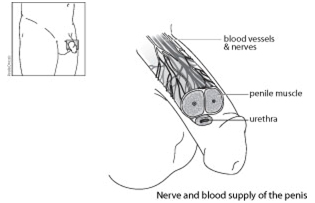
Erectile dysfunction (ED) is the persistent inability to achieve and maintain a penile erection satisfactory for sexual activity. This common problem may have profound effects on the affected man, his partner and their relationship. In most cases, sexual function can be improved with open communication, support, lifestyle changes and, in some cases, medical treatment.
The penis is a muscular organ with a rich blood supply. In its flaccid state, nerve signals to the penis cause partial contraction of the muscle. This restricts blood inflow and prevents engorgement.
With sexual stimulation, the interplay of emotional, hormonal, blood flow and nerve factors increases inflow of blood and delivers chemical messengers which promote relaxation of penile muscle. This produces penile engorgement and rigidity when blood is retained in the penis. After orgasm and ejaculation, the muscle tone returns causing the erection to subside.

The risk of ED increases steadily with age, often as a result of other health problems, including diabetes, high blood pressure, high cholesterol levels and other factors. Despite this, ED is not considered a normal part of aging.
Given the intricate balance of factors necessary to produce an erection, it is not surprising that a problem in any of a number of areas will cause ED. Blood vessel, nerve or hormonal abnormalities are responsible in some cases. In others, medications, especially those affecting one’s mood or circulation, affect erectile function.
Pelvic trauma, surgery or radiation treatment are the cause to ED in some men. Lifestyle habits, including smoking and drug or alcohol abuse, often contribute to the problem. In many men, embarrassment and anxiety only make the problem worse.
The man and his partner are encouraged to approach the problem of ED together. It often helps to talk about one’s feeling about ED and to understand your partner’s perspective. Many couples can enjoy a satisfying physically intimate relationship even if erections are no longer possible.
Treatment is available for most when with ED. The choice of treatment in customized to the needs and desires of the couple. Often, measures aimed at improving other aspects of a man’s health, including stopping smoking and controlling high cholesterol and blood pressure, are helpful.
All men and their partners can benefit from learning about the sexual response and the lifestyle changes that can improve function. Counseling may be useful to improve communication between the partners. In-depth counseling may be available through us, family doctor or a trained psychologist.
The treatment of ED has changed dramatically since sildenafil (Viagra™) has been available. This is the first of a new class of drugs called phosphodiesterase 5 (PDE5) inhibitors which can enhance erections by preventing the breakdown of a messenger that stimulates penile muscle relaxation. Newer PDE5 inhibitors, tadalafil (Cialis™) and vardenafil (Levitra™), have slightly different effects and side effects.
PDE5 inhibitors can be used safely by most men with the exception of those taking certain heart drugs (e.g. nitroglycerin). Side effects are not common and usually short-lived. These include headache, upset stomach and nasal congestion. Unfortunately, these drugs will not work for everyone.
A few men with ED are found to have a very low level of the male hormone testosterone. These men often have a very low sex drive (interest in sex) in addition to their difficulty in achieving adequate erections. When a blood test shows that the man’s testosterone level is very low, hormone replacement will sometimes improve function.
Testosterone replacement can be given in pill form, by skin patch or gel rubbed into the skin, or by injection every few weeks. Testosterone replacement may have side effects which should be monitored by a physician. The prostate should be evaluated regularly given the known stimulatory effect of testosterone on the prostate.
MUSE™ (short for Medicated Urethral System for Erections) is a unique delivery system, in which a small pellet of medication is placed in the urine passage (urethra) from where it is absorbed. This medication then causes the penile muscle to relax and become engorged.
In general, MUSE™ is safe although there have been a few reports of excessively prolonged erections requiring the use of an antidote to produce softening.
A drug or combination of drugs can be delivered into the substance of the penile muscle directly by injection through a fine needle such as that used by diabetics. Most men can learn to inject themselves safely and effectively with little discomfort. An erection will come on about ten minutes after injection and the dose of medication is adjusted so that the erection will last about 30-45 minutes.
Occasionally there can be mild pain or bruising after injection. Prolonged erections occur rarely but require immediate medical attention to prevent permanent penile damage.
Blood can be drawn into the penis with a special vacuum device. This is a plastic tube in which the penis is placed after which a vacuum is created by a mechanical or electric pump. Once the penis is adequately engorged, an elastic band is slid from the cylinder onto the base of the penis to keep the blood from draining out. Intercourse is then possible. When the elastic band is removed, the penis softens.
Surgery is now performed infrequently for the correction of ED. A few men, with blood vessel blockage preventing adequate filling of the penis will benefit from surgery to improve circulation. As a last resort, flexible or inflatable rods can be implanted surgically in the penis to maintain stiffness.
Treatment is available for most men with ED such that their sex life and intimacy with their partner can be improved. The choice of treatment is determined by the wishes of the man and his partner.